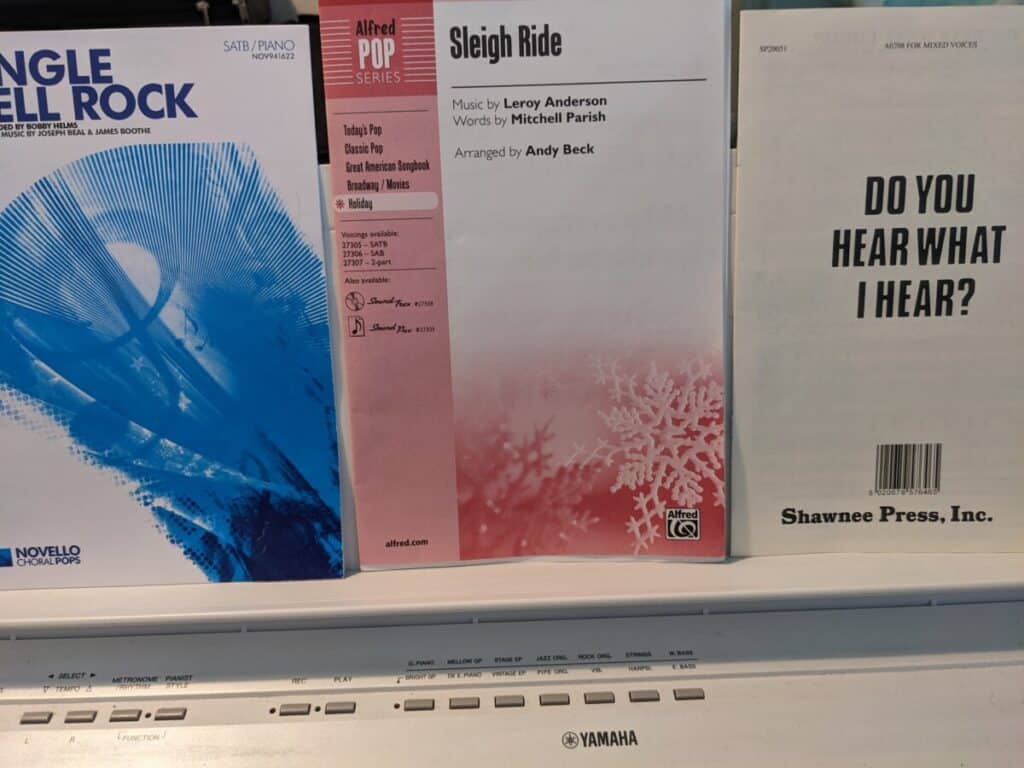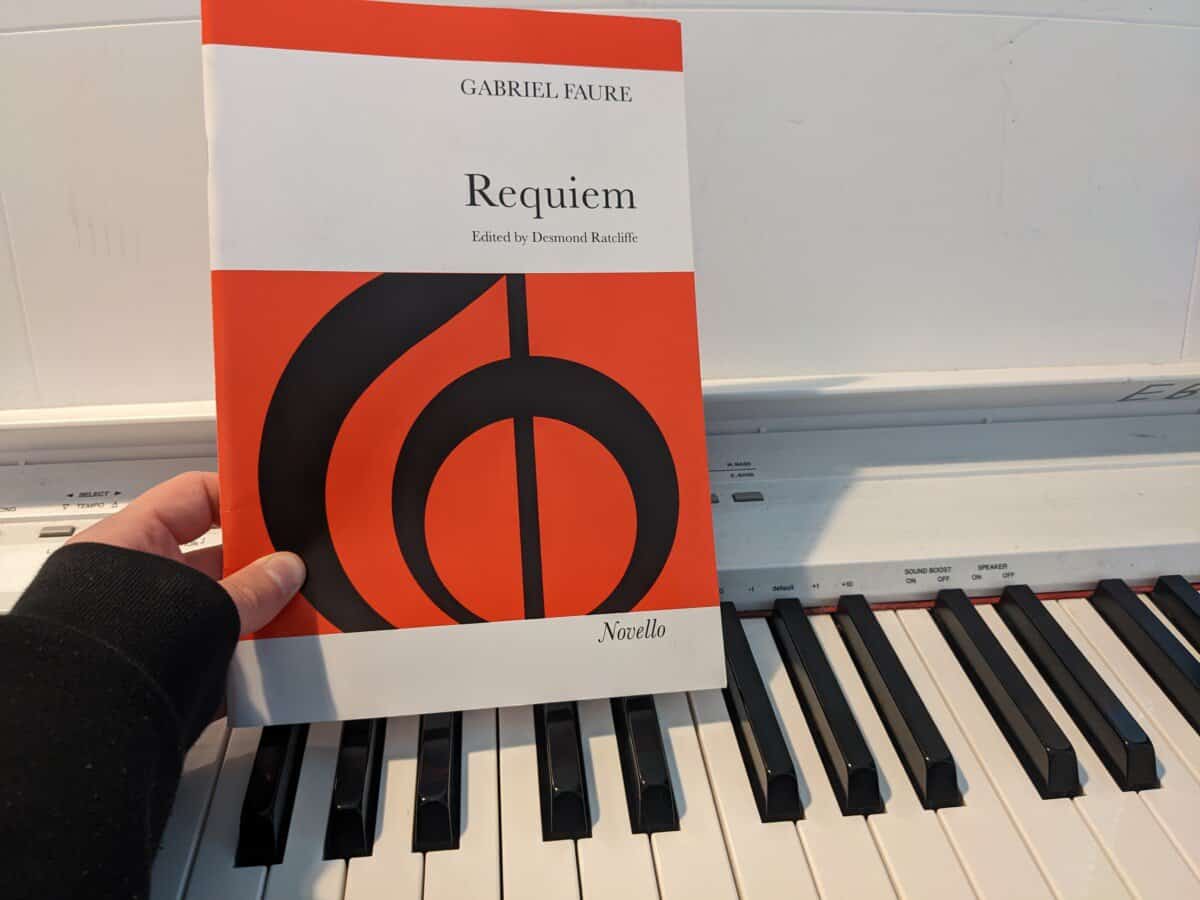Have you always fancied accompanying a choir, but aren’t sure how to make that happen? Or are you already a choir accompanist and are looking for more work? I’m currently the accompanist for 4 choirs, and have worked with many other choirs in the past. I got each of those jobs in different ways.
Before I got these jobs though, I remember feeling stuck not knowing how to get jobs as a choir accompanist.
In this article I’ll take you through the different ways to get choir accompanist jobs, and then I’ll give you my tips for interviews and auditions to get a choral accompanist job.
So what are the different ways to become a choir accompanist?
1) Specific Databases in Your Region
Perhaps the simplest way to get a job as a choir accompanist is to regularly check the dedicated accompanist jobs websites in your country or region. There are a number of websites that choirs post accompanist vacancies on, and invite prospective accompanist to apply for those roles, just like a normal job.
I live in the UK, and the websites that I used to look for jobs on were ABCD, Making Music, and British Choirs on the Net, but all you need to do is Google “choir accompanist vacancies” and check out the relevant sites in your country.
One of the choirs that I currently work with advertised their vacancy on ABCD and that’s how I heard about it and applied.
Applying through one of these websites is probably going to be the most formal application process out of the different ways to get choir accompanist jobs. Towards the end of this article I’ve included my advice for choir accompanist job interviews and auditions.
2) Ask Your Piano Teacher to Recommend You to Their Network
When choir leaders are looking for an accompanist, it’s common for them to ask the piano teachers they know whether they have any students that might be interested. If you have a piano teacher who is local to you, you could mention to them that you are looking for choir accompanist opportunities, and ask that they recommend you to the choir leaders and musical directors that they know.
When I was a student, I got a fair amount of my performance work from my piano teacher recommending me, including one of the choir jobs that I still currently do.
If you don’t have a piano teacher, you can still make use of this method if you want to. I have friends who, when they are looking for music work, get a few lessons each with the top teachers of their instrument in their local area, and demonstrate to those teachers their playing ability, so that the next time that teacher is asked for the names of players that they know, they will likely recommend them. I’ve seen first-hand that this works.
If you live in the UK and are looking for piano teachers in your area, you can use my link to Tutorful to get a free £25 credit off your piano lessons here when you create an account.
3) Facebook Groups for Musicians in Your Area
Don’t underestimate Facebook groups for getting accompanist work. There are plenty of local Facebook groups of musicians looking for other musicians for jobs. I’ve got multiple jobs from these groups in the past.
In the UK there are groups for your specific town, but also your broader geographical region of the UK. If people are posting jobs here, I generally find that there is less of an application process, and generally they are just happy to find someone wanting the job.
If you are already in the process of regularly checking the websites from step 1 for vacancies, why not add these Facebook groups to your list to check every so often. You can just use the Facebook search function to search for “accompanist” rather than manually scrolling through and reading every post if it’s a big group.

4) Set up Your Own Choir
When I was at university, I went to a music careers talk, and the person leading it said a phrase that has always stuck with me: “create your own opportunities”. Before that point, I had always relied on other people offering me accompanying work, and had assumed that was the way that it had to be.
This talk opened my eyes and showed me that if you’re not getting the work that you want, or enough of it, then you can take things into your own hands and create musical opportunities for yourself.
Even though it is more work than joining an existing choir, it’s very possible to set up your own choir, and either lead the choir yourself from the piano, or team up with an MD you know so that you can be the accompanist.
5) Dep for Other Accompanists Last-Minute
It’s quite common for choirs to need someone to step in as accompanist on the day, due to their accompanist being ill or otherwise unavailable. Often if this happens, the accompanist who can’t make it will reach out to the pianists that they know to try and find someone to cover them.
Making it known to your network that you are happy to be contacted about this kind of last-minute work can make you a good option for people to go to when they need a dep for their choir.
Whilst covering the odd rehearsal is not the same as a permanent accompanist role, it’s possible that when the choirs you’ve helped out in the past have an accompanist vacancy, they may ask you.
Another thing you can do is to email any local choirs that you would like to be the accompanist for, offering your services to dep as accompanist, including last-minute (if you can), if they ever need. You’d be surprised how often choirs need accompanist deps, and many would be grateful for an extra person for their list of accompanists to contact when they need cover.
6) Once You Have One Job, Ask Your MD for More
This tip is only relevant once you’ve got your first choir accompanist job, but once you are the accompanist for a choir using these other methods written above, you can let the MD of that choir know that you are looking for more work.
Chances are that if they are the MD for one choir, they are the MD for multiple choirs, and even if that’s not the case right now, they may take on other MD jobs or start new choirs in the future, and if you already know that the two of you can work well together then it makes sense for you to be the person they’d want to accompany their next choir too
7) Be a Singing Member of a Choir
A lot of choir accompanists were originally singers in that same choir, and when the previous accompanist left, they stepped up and took their place.
If you just generally enjoy making music and would enjoy being part of a choir either way, then you could consider joining a choir as a singer, and offering to dep as accompanist for the odd rehearsal when the accompanist is away.
As a member of the choir already, you’ll be the first to hear about the current accompanist leaving, and you can put yourself forward if that ends up being the case.
This is how I got my first few choir accompanist positions. However, of course if singing in a choir isn’t something that you’d enjoy then it’s probably not worth it just for the chance to put yourself forward to be accompanist should the current accompanist happen to leave. If that’s the case then stick with points 1 – 5 above.
Interview and Audition Tips for Choir Accompanist Jobs
Some choirs will require you to audition and interview with them for a choral accompanist position.
The audition part will often look like this: you’ll likely be asked to prepare some accompaniments in advance, and accompany the choir for a portion of one of their rehearsals, as your audition. The MD will likely get you to do all of the things that this particular choir accompanist role would involve, such as playing for the vocal warm ups, and potentially (but not always) sight-reading some accompaniments on the day.
You’ll likely be told beforehand exactly what the audition will look like. I always have been told the vague rehearsal plan when I’ve done choir accompanist auditions.
Interviews vary depending on the way the choir is run. If the choir is run by a committee, then you will likely have an interview with some members of the committee as well as the MD. If the choir is run by only an MD as their individual business, then it tends to be less formal and may take the form of an informal phone call or casual meeting instead.
Here are some questions that I’ve previously been asked in choir accompanist job interviews:
- How did you start accompanying choirs?
- Why do you want to accompany this choir specifically?
- Do you have a reliable way of commuting?
- What experience and qualifications do you have?
These are all fairly standard interview questions that you can likely prepare a good answer to yourself, but there are some more specific to choir accompanying questions that you might be asked that I’ll give my take on here:
- Are you happy to lead the odd rehearsal as MD from the piano when the MD is absent?
It can be a real advantage if you are happy to step in and lead a rehearsal if the MD is ill or otherwise unavailable. It’s not essential, as the MD can always find an external dep to cover their absences, and I think it’s better to be honest about this in interviews either way. But if 2 applicants were otherwise identical, then this would sway it in your favour.
I’ve written more about this in another article here about how to be a good choir accompanist.
- Do you understand the vibe of the choir?
Different choirs have different reasons for being there. Is the choir you are applying to a very serious choir that is solely focused on learning serious repertoire well? Is the choir a community choir that is all about people coming together as a social group to enjoy a light-hearted bit of singing for fun? Is the choir somewhere in the middle?
Showing that you understand what the choir’s aims and priorities are well signal that you could fit in well and have similar values to the rest of the group.
My final interview/audition piece of advice is this:
Chat to choir members before/after the audition
Choirs are of course looking for someone who can accompany well on the piano, but often more than that they are looking for a human being who wants to join in and be part of the group, and maybe attend social events if that something your choir offers.
This is of course not essential, as it goes above and beyond the basic job description of a choir accompanist, and it’s totally valid to just see it as a job and nothing more. But if you think that being part of a community would be something that you’d enjoy and get value from, then I’d encourage you to socialise with the choir members who are present at your audition.
This could be before the audition if you get there early, it could be in the break if it’s a long audition, or it could be after the audition. Afterwards might be the easiest thing to do, as you might be nervous before the audition and just focusing on that.
One of my choirs is run by a committee who releases the minutes of each committee meeting so that they are available for choir members and myself to read, and that includes a written account of the meeting where they decided that I was successful as the next accompanist after their audition process.
When I auditioned for them, I got there early to have a (nervous) chat with some of the committee members, and I stayed for a bit after my auditioned to chat to some of the choir members. Reading that document was really helpful in validating my feelings that choirs, particularly community choirs, value having an accompanist who wants to get to know the choir members and wants to feel included as part of the group.
I don’t advise faking this if it’s not something that you are at all interested in, and you just want the job for the music side of things. But if the community part of the job is important to you then I would encourage you to make an effort with the social side of things at the audition if you can! Although it’s totally understandable if nerves get in the way of this, and the MD and choir should understand that.
If you’d like my tips from my personal experience on how to be a great choir accompanist then check out my other article here.
Thanks for reading, and all the best with your choir accompanying journey!

